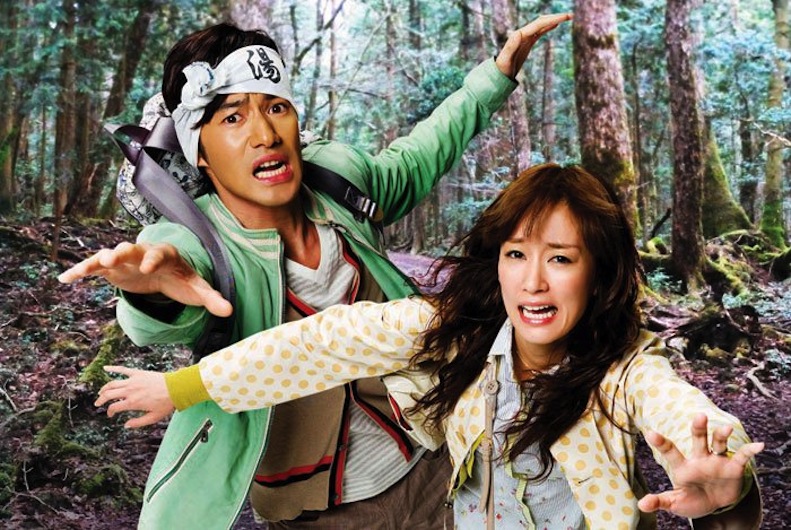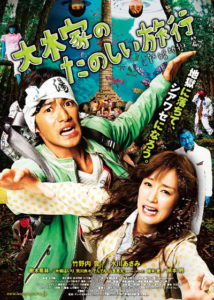[stextbox id=”grey” caption=”A Honeymoon in Hell: Mr. & Mrs. Oki’s Fabulous Trip (2011)” float=”true” align=”right” width=”200″]
Director: Ryuichi Honda
Runtime: 121 minutes
Starring: Yutaka Takenouchi, Asami Mizukawa
Country: Japan
Rating: Highly Recommended (?)
[/stextbox]
Based on so-hot-right-now Japanese playwright and author Shiro Maeda’s novel, A Honeymoon in Hell: Mr. & Mrs. Oki’s Fabulous Trip (大木家のたのしい旅行 新婚地獄篇) is not your typical film. Ryuichi Honda has taken a familiar theme in film, that of a marriage losing its spark, and filtered it through a vision of hell that is unlike any other. Honda was last seen with his 2008 retro-fuelled musical GS Wonderland, and with the casting of star Yutaka Takenouchi, it is inevitable that this was going to gain some attention.
Nobuyoshi Oki (Yutaka Takenouchi, Oba, The Last Samurai) and Saki (Asami Mizukawa, I Am) are a newlywed couple, but they have been living together for years. Realising that their lives have hit a slump, they notice that their rice cooker has gone missing shortly after moving into a new apartment. After spotting a dripping wet man carrying their rice cooker, a fortuneteller (Kirin Kiki, Villain) tells them that it is probably in Hell, and that trips are available. Deciding that a break would be a good idea, the two prepare for an overnight trip to Hell. Hoping to re-spark their marriage, they dive into the bathtub entrance, they wind up in a completely unexpected place.
Honda and Maeda’s vision of Hell is certainly a unique one, with Lucifer and his minions nowhere in sight. The couple finds themselves in a forest, followed by a quarry and ultimately a luxury resort run by Blue People. The central gag is that even Hell is not quite what you expect, and there is definitely more than a single poke at the tourist culture of going to one of the most exotic places and staying in luxury accommodation, or perhaps even just the onsen holidaymakers that flood Japan annually. Sampling everything the world has on offer, the couple encounter a hotel with a seemingly endless spiral staircase, all-you-can-eat-shrimp that must be beaten into submission, cheap night markets with rubber band delicacies and a hot bath that appears to be made of beef stew. Hell is a strange place, but the humour is deadpan and understated, with our leads accepting the strangeness more often than running in terror.
While Japanese cinema, at least the kind that gets released to homes in Australia, has a habit of going over the top, for a film about the bizarreness of a parallel plane of existence, Honda keeps this film subdued. The tone for the film is set early in the piece, where the Okis walk along a forest path towards the resort, having been warned not to look back. As a marching band does increasingly energetic and attention grabbing performances behind them, the couple steadfastly refuse to look. We catch glimpses of the events, but of course, when the couple finally relents, we see nothing as they are cast into a quarry and faced with the angry Red People, a group devoid of human niceties, but apparently very artistic. Filled with bright colours and angular photography, A Honeymoon in Hell has a restrained palette, not something that can often be said of a film that has multi-coloured people and beef lakes.
The strongest element is the couple themselves. Unlike most “film couples”, Takenouchi and Mizukawa feel as though they have been together for years, and there is a relaxed back-and-forth between them. As each new crisis arises, they rely on each other for help, and this is perhaps the film’s central theme: familiarity does not breed contempt, but rather stronger bonds. Then again, it could simply be commenting on the natural cycle of the couple: marriage is a response to a relationship that has had nothing new in it for some time, as is the idea of a honeymoon holiday. As their guide Yoshiko (Ai Hashimoto, Atsushi Wada’s Avatar) ultimately reveals the path for the Blue People out of Hell, we get a hint as to what the next step in the cycle of marriage might be.
[stextbox id=”custom”]A Honeymoon in Hell: Mr. & Mrs. Oki’s Fabulous Trip is a bizarre film, but a hilarious one as well. The humour may not be accessible by all, but for those tuned to the right frequency, or simply needing a break from the norm, this is one wild ride.[/stextbox]
A Honeymoon in Hell: Mr. & Mrs. Oki’s Fabulous Trip is playing at the Japanese Film Festival on 19 November (Sydney) and 2 December (Melbourne) 2011 at the 15th Japanese Film Festival in Australia.






